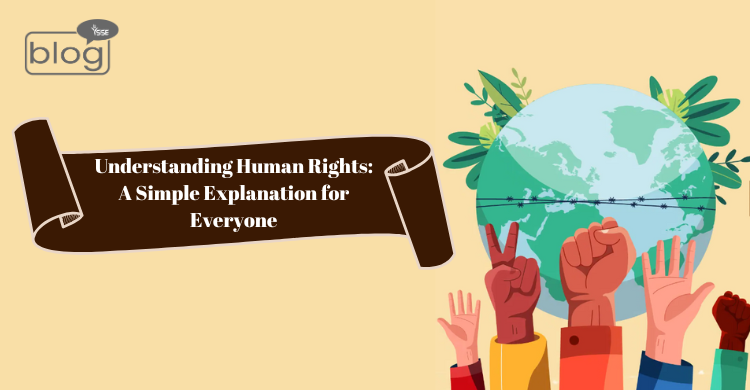What are human rights? To get the answer, let’s go back in time.
1948. Does this date remind you of something? I’m sure you have studied it, at least in your history classes. This is a significant date. It’s the year the United Nations adopted something called the Universal Declaration of Human Rights.
But wait a little bit! What is that? What do I mean by the Universal Declaration of Human Rights? It is a document that talks about basic human rights that all people have just because they are human. To get a clear picture of this, let’s look at the situation of the world before 1948.
If you have been asked this, what was the world like before 1948? You would definitely say that the situation was not a good one since there were a lot of wars and conflicts, just like World War I and World War II. Another common thing was violence. A lot of people were subjected to violence, such as women, children, and ordinary people. One more common thing was discrimination and racism, which means making a difference between people because of their gender, language, race, color, etc. One common problem was the absence of democracy, which is called dictatorship. Another common problem was arbitrary arrest, which means arresting 10 people for no reason or sometimes for their political opinions or views. Another problem was slavery. Slavery means regarding some people as slaves. Because of these problems and a lot of other problems, we can conclude that life was miserable for so many people in many parts of the world.
To change the situation and have a happy life, they started protesting and asking for their rights. Until the countries of the world finally agree to meet and adopt what is called the Universal Declaration of Human Rights, which is based on the idea that all people are equal and should enjoy the same rights.
The Universal Declaration of Human Rights came with a long list of articles and rights, but today, we shall only give examples of the basic human rights every person has.
- All human beings are born free and equal.
- All persons are subject to all the rights and freedoms without distinction as to race.
- Right to life
- No slavery
- Torture and inhuman treatment are not allowed.
- The same right to use the law
- Equal before the law
- Right to be treated fairly by the court
- No unfair entertainment
- Right to trial
- Innocent until proven guilty
- Right to privacy
- Freedom to move and live
- Right to asylum
- Right to nationality
- Civil liberties to marry and have children
- Right to own things
- The freedom of thought and religion
- The freedom of opinion and expression
- Right to assemble
- Right to Democracy
- Right to Social Security
- Right to work
- Right to rest and holiday
- Right of social service
- Right to education
- Right of cultural and art
- Freedom around the world
- Subject to law
- It is a fundamental principle that human
So, these are the 30 fundamental freedoms that should be accorded and defended by the law.
To read more blogs, click here.
Writer
Ferdous Ara Rimi
Intern Content Writing Department
YSSE

